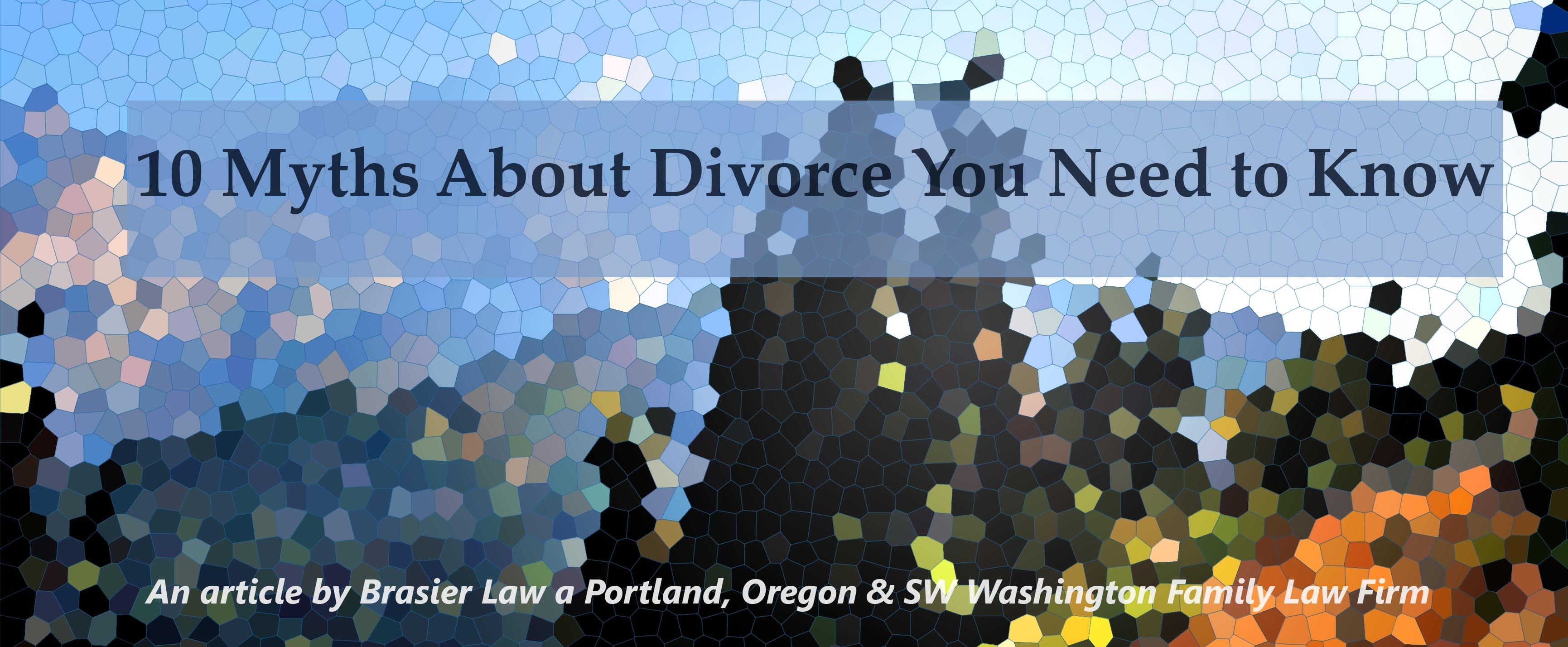These days everyone going through a divorce hears advice from friends, family, and even strangers on various social networks, who all are sure they know some really important facts about divorce. They have often gone through a divorce or know someone who has and do know facts about their own case, unfortunately any experienced family law attorney can tell you not all cases are treated equally. Although your friends or family may have what sounds like great advice, in reality, there is a lot of bad advice out there that have developed into myths. Brasier Law has decided to address the top 10 divorce myths we have seen when people come into us in our Portland or Washington offices.
Top 10 Divorce Myths You Need to be Aware of
1. If the father doesn’t pay child support, you don’t have to let them see the children.
This in fact is absolutely incorrect. Courts in Oregon and Washington specifically separate the issue of child support and parenting time to ensure that one parent doesn’t get to hold the children hostage over unpaid money.
2. Some states still consider “fault” in a divorce.
It used to be that if you committed adultery, or otherwise caused the divorce, that the court could give you less property or otherwise punish you for your bad acts. Oregon and Washington do not hold to this old rule. The only time an act of adultery or other bad action can hurt your divorce case, is if the act shows bad judgment in relation to custody of the children. For instance, if you take your 6 year old on a date with the guy you just met on craigslist with you or expose them to any adult activity, then that could have ramifications on whether the judge trusts you to be a healthy parent. But otherwise an affair doesn’t hurt your case.
3. If the judge awards my spouse the house, then I am safe if she doesn’t pay the mortgage.
This is false. The judge has the power to award “title” of your house to the other party, but they cannot step in front of the mortgage companies’ contractual right to recover from you if your spouse doesn’t pay. A lot of people demand the person getting the house to refinance the mortgage within a certain period of time, as a refinance would remove your name from the mortgage.
4. Divorces have to be ugly.
This is absolutely false, and in fact I would strongly encourage anyone reading this to look into the option of an uncontested divorce. Most divorces actually don’t have anything that need to be fought over. Usually both people are angry, but if they sit down and analyze their situation, more often than not the actually disputes are pretty small and can be negotiated with trial completely or mostly avoided. If both sides can sit down and agree on the stuff, like spousal support, property division, and parenting plans, then all you need to do is find an attorney (or do it yourself if you can manage) to draft the simple paperwork to get signed by your local judge.
5. A stay at home spouse can rely on getting their bills paid by their wife.
This is false, because the judge has to balance both people’s right to have their own bills paid. Certainly if your spouse is a millionaire, then you likely will be taken care of for quite a while. However, most people simply cannot afford to support two households in today’s economy. If you are a stay at home spouse, you probably will have to plan on going back to work and radically changing your lifestyle if you go through with your divorce.
6. In a community property state everything is always divided equally no matter what.
This is not true, as the rules on property and asset division are complex and vary from state to state. All a community property state means is both spouses own the assets equally. It does not mean both parties are going to end up with equal pieces of the pie. Many community property states allow the lower earning spouse to get a higher percentage of the assets to better help them work towards retirement.
7. People are entitled to half of their spouses inheritance if they divorce.
This is mostly false, particularly if the inheritance hasn’t come through yet. In most states also, if the inheritance has never been commingled with marital assets, then it often will be kept separate from the marital estate to divide.
8. One spouse can choose not to get divorced.
This is not true, in the case of a divorce it only takes one to tango. If one person wants to get a divorce, they get to do that no matter how much the other person wants to stay together, this can be very painful for one partner if they still want to be married, but the state will not require an unwilling party to remain in a marriage. Some states do have a cooling off period before they will finalize the divorce, but if all timelines have been met, they will let the divorce go through even if one person objects. The best you can hope for is to delay the process.
9. You can get an annulment if your marriage is less than a year.
Every state has their own rules for when you can get a divorce annulled (which means it gets voided like it never happened). However, I know of no state that allows that to happen based on the marriage not lasting long. Usually you can only get an annulment if someone committed fraud (like they used a false name and identity) or some other clear bad act.
10. Spousal support and child support are treated the same.
There is an important tax consequence to spousal support versus child support. Child support has to be paid by the person after they pay their taxes, and it is not treated as income to the receiving parent (so they don’t have to pay taxes on it). Spousal support is the opposite, it is tax deductible to the payer, but is treated as income for the recipient (so you have to pay taxes on the income). Also, sometimes the IRS will not let you get away with calling a clear spousal support payment as child support and vice versa, they are wise to people trying to play tax games with these two things, so if you are trying to be tricky with your support orders you need to hire a good lawyer to protect your interests.
We hope that these ten divorce myths have helped you to understand some of the common misconceptions out there about divorce and custody. We love that people go to their friends and family to help them through a divorce, but we also want to make sure people are getting good information about what to expect in a divorce and often the best way to get an idea of what your particular case will look like is to talk directly with an experienced divorce attorney.
Feel free to contact Brasier Law for a free consultation to better understand what to expect from your divorce.
1 (503) 855-4777 or toll free at 1 (855) 328-9108 or use the contact form below.
Contact Us
We would love to schdule a free consultation to discuss how we can help you with your family law needs. Our family law attorney will get back to you as soon as possible to discuss your needs. We have offices in Portland and serve Oregon and Washington. Thank you for your interest in our firm. The use of the Internet or this form for communication with the firm or any individual member of the firm does not establish an attorney-client relationship. Confidential or time-sensitive information should not be sent through this form.You may find these articles helpful as well:
Three Things to Look for in a Divorce or Custody Attorney
What Does Full Physical Custody and Legal Custody Really Mean
3 Ways to Keep Your Amicable Divorce From Getting Ugly Even After You Hire an Attorney
Or check out all our articles on our articles page.
Tom Brasier is an experienced Portland, Oregon family law attorney for Brasier Law, an Oregon and SW Washington based divorce and custody law firm.


